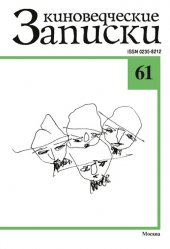 |
 |
I
XXIV MOSCOW INTERNATIONAL FILM FESTIVAL
PROCESS
Oleg ARONSON. Adapting Literary Works: Clash of Approaches.
Kira Muratova’s Chekhovian Motifs and Vittorio and Paolo Taviani’s version of Leo Tolstoi’s Resurrection are reviewed in the context of major issues of literary classics’ screen adaptation.
Tatiana VETROVA. New and Old Problems of Ibero-American Cinema.
Review of the Festival’s Spanish and Latin American film program.
PERSONALIA
Stanley Kubrick
Oksana PERETRUKHINA. Stanley Kubrick’s Philosophy: From Alex to Barry Lyndon and Back.
Analysis of key topics and motifs in the director’s oeuvre.
Interview with Jan Harlan, Kubrick’s long-time assistant and the author of the film about his life and work.
Grigorii Chukhrai
«He Was Totally Worthy of His Films’ Heroes»/ Chukhrai is remembered by Aleksei BALABANOV and Nikolai LEBEDEV. Moderator – Tamara Sergeeva.
Supplement:
Transcript of a Discussion of The Forty-first by Mosfilm’s Artistic Council.
Balabanov, director of War (2002) and Lebedev, director of The Star, the 2002 remake of a 1949 World War II film, speak on today’s topicality of World War II veteran Chukhrai’s cinematic heritage. The supplement contains materials regarding the initial reception of Chukhrai’s debut work.
CINEMA MUSEUM (I)
«Unknown Barnet». A Retrospective.
«Until the Very End, He Couldn’t Make Himself Produce Films to Order». Reminiscences about Boris Barnet by Marlen Khutsiev, Gennadii Poloka, and Otar Ioseliani. Moderator – Tamara Sergeeva.
Evgenii MARGOLIT. The Time and Historical Place of Boris Barnet.
Liubov STARIKOVA. Barnet Was Born and Lived in This House.
Irina GRASHCHENKOVA. Boris Barnet and Abram Room. A Double Portrait.
Supplement:
«An Unbelievably Easy Person to Work with». Barnet in Kiev. Memoirs by N.A.Gebdovskaia, S.M.Tsibulnik, and E.Vasilko-Gakkebusch.
Boris Barnet’s Letter to Inna Filimonova. (Published by V.A.Khlebnikova and E.O.Dolgopiat).
Was Boris Barnet a totally unique case for our cinema or was he a «legitimate» brother of other outstanding Russian filmmakers? This and other questions are at the center of the above publications.
II
FROM THE HISTORY OF FILM THOUGHT
Viktor Shklovskii’s Forgotten Texts.
«The Corruption of Cinema»/ – «Polikushka»/ – «Psisha». – Preface to Chaplin, a collection of essays. – From the book Literature and Cinema. Form and Material in Art.(Republication, introduction and comments by R.M.Yangirov).
Little-known theoretical pieces and film reviews (1918–1923) by Shklovskii.
RESEARCH
Natalia GROMOVA. The Law of Life and the Fate of Sergei Ermolinskii. Records of the Soviet scriptwriter’s interrogations by the NKVD.
Liudmila GOLUBKINA. A Lyrical Afterword.
Sergei A. Ermolinskii (1900–1984), a prominent scriptwriter, was unfair prosecuted in 1940 and was unable to work in cinema for a number of years. Presented materials deal with the 1940 film The Law of Life, which was to play such a fateful role in Ermolinskii’s life and career.
Yuri SAAKOV. Thrice «Glory!» Or «Hey, That’s Not True!»
The article about poet Vladimir Lugovskoi and director Grigorii Aleksandrov’s joint work on the 1951 film Composer Glinka.
Georgii BORODIN. Nikolai Erdman and Animation.
Evgenii MIGUNOV. Two Encounters with Erdman.
First analysis of the prominent scriptwriter’s work in film animation. The supplement contains a filmography of animated cartoons scripted by Erdman.
A TOPIC FOR RESEARCH
Evgenii MARGOLIT. The Cinema of the Thaw. Notes on a Phenomenon.
According to the author, the subject of the cinema of the post-Stalin «thaw» (1953–1964) and its true plot are constituted by the ripening of the personal within the collective.
CINEMA MUSEUM (II)
Gennadii Shpalikov. The Beginning.
Diaries (1955–1956) – «Why I Decided to Become a Filmmaker». – «On Music». – «Let’s Get Acquainted!» – «Stars on the Move (A Witness Account)». – [Interview with Grigorii Chukhrai]. – «The Red Balloon (A Commercial)». – «Valentin K.Turkin. In Memoriam». – «My Speech at a Komsomol Meeting to Be Held at the Year’s End». (Introduction, publication and commentary by E.O.Dolgopiat).
Diaries and other texts written by the celebrated scriptnwriter and poet during his studies at the All-Union State Institute of Cinematography (VGIK).
LOOKING BACK AT A FILM
The End of a Century Discussed by Nina Dymshits, Oleg Aronson, and Irina Shilova.
Konstantin Lopushanskii. Fragments from The End of a Century script.
Konstantin Lopushanskii’s The End of a Century, which was released in 2001, remains an object of a strong public and critical controversy. By publishing a selection of relevant reviews and thoughts, the editors wish to stimulate the debate around this film’s significance in today’s social, cultural and cinematic context. The discussion is supplemented by the screenplay’s fragments, which were not included in the film’s final version.
ARCHIVES
«So You Don’t Make Trash Like The Accordion Any More?» Records of Boris Shumiatskii’s conversations with Joseph Stalin, held after film viewings in 1934. (Publication, introduction and commentary by Aleksandr S.Troshin).
Much has been written by participants, witnesses and scholars about film shows held at the Kremlin during the 1930s. Those late night screenings often decided the fate of one or another film and sometimes sealed the fate of their makers. The Russian State Archive for Socio-Political History (RGASPI) preserves brief records of comments made by Stalin and his political associates after those viewings, which are among the most eloquent and authentic evidence of these sessions’ nature and importance. Between 1934 and 1937, Boris Shumiatskii, the then head of Soviet film industry and the viewings’ organizer, took regular notes of those comments – until he himself became a victim of Stalinist purges. His notes.
LETTERS FROM THE PAST
«I Don’t Like It When the Horizon Starts Trembling…» Aleksandr Dovzhenko’s Letters to Ivan Sokolianskii. (Publication, introduction and commentary by S.Trimbach).
Dovzhenko’s letters to a friend, a prominent defectologist, demonstrate the filmmaker’s great interest in the study of the human mind’s potential.
CAREERS AND ADVENTURES IN CINEMA
Victor VATOLIN. Essays on Early Cinema in Siberia (1896–1917). Part II. Chapters from a book about first film shows, cinema pioneers, and the beginnings of film production in Siberia, based on a wealth of previously unknown data. |
|
 |
|||||||||||||||||||||||||||||||||||||||||||||||||||||||||||||||||||||||||||||||||||||||||||||||||||||||||||||||||||||||||||||||||||||||||||||||||||||||||||||||||||||||||
| « | » |
является незаконным.



